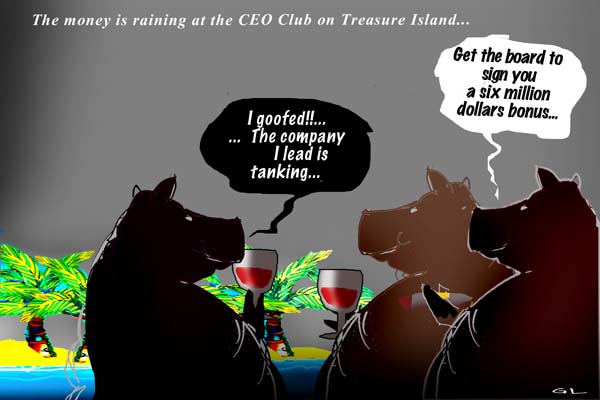Search
Recent comments
- breeding insanity....
1 hour 38 min ago - american "diplomacy"
4 hours 34 min ago - deceit america....
6 hours 53 min ago - police-state....
16 hours 34 min ago - the war continues....
17 hours 22 min ago - scott is angry.....
1 day 23 min ago - a catastrophe?....
1 day 4 hours ago - 3Xwars is 3Xpeace?....
1 day 6 hours ago - futile trousers....
1 day 6 hours ago - reading reality....
1 day 6 hours ago
Democracy Links
Member's Off-site Blogs
the wages of swines...

THOUSAND OAKS, Calif. — As the board of Amgen convened at the company’s headquarters in March, chief executive Kevin W. Sharer seemed an unlikely candidate for a raise.
Shareholders at the company, one of the nation’s largest biotech firms, had lost 3 percent on their investment in 2010 and 7 percent over the past five years. The company had been forced to close or shrink plants, trimming the workforce from 20,100 to 17,400. And Sharer, a 63-year-old former Navy engineer, was already earning lots of money — about $15 million in the previous year, plus such perks as two corporate jets.
- By Gus Leonisky at 4 Oct 2011 - 5:58pm
- Gus Leonisky's blog
- Login or register to post comments
the wages of slaves...
The gap between what workers and top executives make helps explain why income inequality in the United States is reaching levels unseen since the Great Depression.
Since the 1970s, median pay for executives at the nation’s largest companies has more than quadrupled, even after adjusting for inflation, according to researchers. Over the same period, pay for a typical non-supervisory worker has dropped more than 10 percent, according to Bureau of Labor statistics.
http://www.washingtonpost.com/business/economy/cozy-relationships-and-peer-benchmarking-send-ceos-pay-soaring/2011/09/22/gIQAgq8NJL_story.html?hpid=z2
"pity the executives who get too much money"...
“The impact of high pay? Execs buy a third house, they get attacked by professional fund raisers, they spend money on stuff that takes up the thinking time.”
These are the words of the former chief executive of a top share market-listed Australian company who weighed into the executive pay debate in the wake of BusinessDay's coverage yesterday on the inefficient market for executive labour.
Speaking on condition of anonymity, the executive said the impact of high pay on executive performance was “negative”. Further, he argued that aligning management with shareholders through equity was based on a “fallacy of logic”.
“In fact, it is the opposite. Executives don't work harder when the company's shares fall in value, they panic.
“Execs don't work better when (the) shares rise, they get comfortable and take too many risks.”
Executive share schemes, he said, were based on a “further tier of bulls***”:
“Shareholders hold a tiny fraction of their wealth in each company, but execs get share ownership schemes that can mean over 50 per cent of their wealth is tied up in the company shares. This is not alignment to begin with and leads to other distortions.”
Read more: http://www.smh.com.au/business/the-impact-of-high-pay-20111011-1lin4.html#ixzz1aT8sL8xw
inflated execs...
An investment group is calling for Australian businesses to greatly increase the link between company performance and executive pay.
The Australian Council of Superannuation Investors says the increase in pay for executives is greatly outstripping company performance.
Its chief executive, Ann Byrne, says the group is looking closely at the remuneration reports of companies listed on the ASX.
"Over the [past] 10 years the medium pay of CEOs of the ASX 100 has increased 131 per cent with the median bonus increasing 190 per cent," she said.
"Whereas the S&P ASX 100 had increased 31 per cent."
Ms Byrne says that means executive pay is outstripping the return to shareholders.
http://www.abc.net.au/news/2011-10-11/executives-take-stock-of-pay-packets/3499354
more inflated execs...
Then how can the business leaders credibly hammer on about the need for lower wages in their workforces - a la Qantas - when they are displaying zero leadership in productivity terms themselves? They answer is, they can't. Despite the massive budgets expended on buying public opinion (funded by shareholders), the public isn't swallowing it. Business leaders are missing the global mood.
The Occupy Wall Street protests are evidence of US business leadership being out of step with the public. Our far stronger economy has shielded Australia from similar outcry.
The sad thing is that the messages from business leaders: on tax and regulatory reform, infrastructure and fiscal rectitude and so forth, are undermined by perceptions of rampant self-interest principally in this almost paleolithic thinking on pay.
Another lion of the business establishment Don Argus, former BHP chairman, dismissed concerns over executive pay yesterday as if the rest of the country had it wrong.
''If they're worried about executive pay, they shouldn't be in the equity market,'' he said. ''The one thing that I've learned … is that if you don't have quality people on the board, or in the executive ranks, you will not turn that dollar [invested by shareholders] into extra value.''
Is this the stuff of a parallel universe? The evidence on productivity is plain for all to see.
The BCA campaigned vociferously in the late '90s against increased disclosure of executive pay, citing among other exotic rationale, that it could lead to kidnappings. The only thing that seems to have been sequestered is shareholder returns.
Read more: http://www.smh.com.au/business/good-call-on-productivity-mr-bradley--shame-your-pay-has-outpaced-your-performance-20111012-1ll3g.html#ixzz1abb38FmV